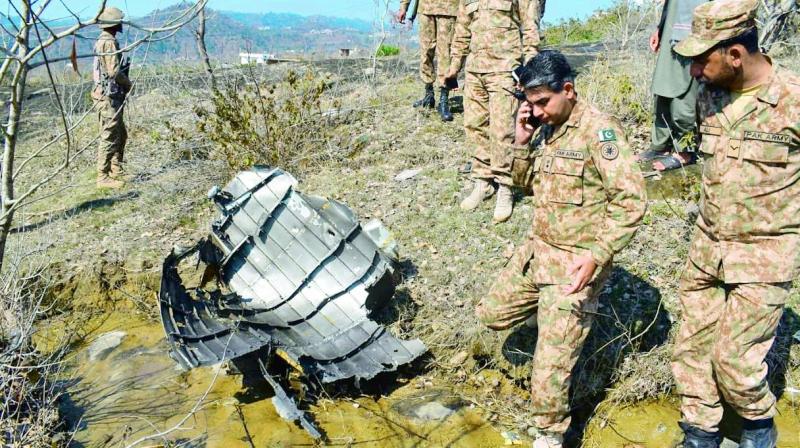Pakistan never acted on dossiers, says experts
The documents pointed out that the UN-proscribed terror outfit has its presence in Pakistan.

Hyderabad: India gave Pakistan a dossier after the Pulwama attack, specifying the role of the Jaish-e-Mohammed, but this was not the first time Delhi gave Islamabad information on wanted terrorists.
The Centre had earlier presented dossiers on the Lashkar-e-Tayyaba’s activities after the 26/11 Mumbai terror attack, Pathankot air base attack and on underworld don Dawood Ibrahim.
In 2010, India had shared 11 dossiers with additional and supplementary information about Lashkar founder Hafiz Saeed, for his alleged involvement in the Mumbai terror attacks and possible role in other blasts.
However, experts opinioned that sharing documents on “terror outfits” whose roots have been traced to Pakistan, has become more of a “formality” because history shows that Pakistan has acted less upon it.
After the Pulwana attack, in which 44 CRPF jawans were killed, India on Wednesday India handed over to Pakistan a dossier with “specific details” of the Jaish-e-Mohammad’s involvement.
The documents pointed out that the UN-proscribed terror outfit has its presence in Pakistan. It was handed over to the acting high commissioner of Pakistan. But whether Pakistan will act against terrorism is questionable.
Former home secretary K. Padmanabhaiah told this newspaper: “The LeT, an Islamic terrorist organisation based in Pakistan, carried out a series of bombings across Mumbai in the incident referred to as 26/11. The Centre handed specific details about the Lashkar to the Yousaf Raza Gilani government. In fact, according to reports, the Centre chalked out specific offences committed by Lashkar founder Saeed under the Indian Penal Code. The Centre also specified that Saeed tried to wage a war against India. Details of his involvement with Lashkar-e-Tayyaba operative Zaki-ur-Rehman and gunman Ajmal Kasab were handed over. But except for confirming that Ajmal was a Pakistani, they did not act on the Lashkar-e-Tayyaba.”
He further said: “India gave them details about Dawood Ibrahim. Have they done anything? The Pakistan government is controlled by their Army and the ISI. The present Prime Minister was elected to power with Jaish-e-Mohammad chief Masood’s support.”
Prior to the Pulwama attack, in 2016, it was the United States that had handed a dossier which comprised details of terrorist handlers such as Kashif Jaan and inputs investigated by the National Investigating Agency (NIA).
“One needs to understand the functioning of the Pakistan government to comment on their action against terrorism,” said Lt. Gen. Mohan Bhandari (retired).
“Pakistan Prime Ministers are elected with the help of their Army, ISI and the highly radicalised terror outfits. Pakistan Prime Minister Imran Khan is controlled by Rawalpindi, the headquarters of the Army. Over the years, be it Shahid Khaqan Abbasi, Nawaz Sharif or Yousaf Raza Gillani, their Army controlled them all,” Gen. Bhandari (retd) said.
“It is their Army that runs a parallel government, thus many generals (chief of staff) don’t retire. The generals own banks, infrastructure and more. You give them a dossier or any document to prove role of Pakistani homegrown terror outfits in a blast, it will be brushed aside,” he said.
Gen. Bhandari (retd) said JeM chief Masood in 1999 after the Indian Airlines aircraft was the price India is paying. :In recent years, pressure from UK, USA and Russia is mounting on them to wind up highly radicalised terror groups,” he said.
A senior officer working with the intelligence wing said on condition of anonymity: “How will Pakistan take action against these groups when its own government is involved in the terror blasts there? Have they ever acted upon Harkat-ul-Mujahideen, Jaish-e-Mohammed/Tahrik-e-Furqan, Lashkar-e-Tayyaba/Pasban-e-Ahle Hadis, Hizb-ul-Mujahideen and other groups banned under Section 35 of the UAPA?”
“The twin blasts in Hyderabad were carried out by local terrorists but with support from outfits based in Pakistan,” said former DGP Swarnajit Sen. “There are helpers in India for these handlers, which the police and the Intelligence should dig deep to curb further damages,” he said.
Mr Sen said dossiers had become more of a counter-country drama after a blast. :After the 26/11 attacks, the Centre gave Pakistan details of terrorists killed in counter-firing in India. The details included that of their parents. Pakistan bluntly denied their existence. India has to think of other methods than handing over evidence to Pakistan. Dossiers were never respected because the country itself is guilty,” Mr Sen said.

